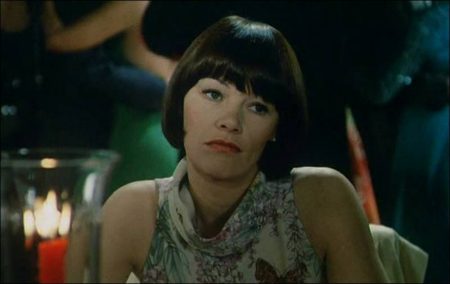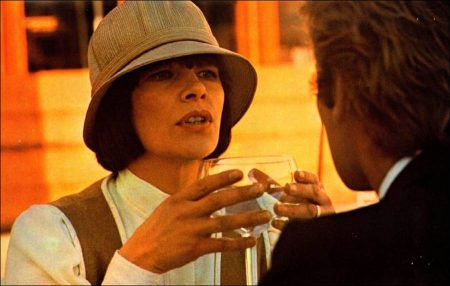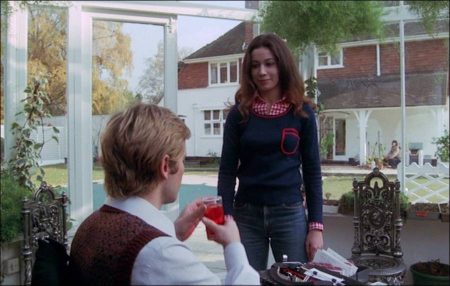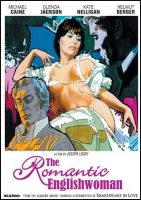The Romantic Englishwoman movie storyline. What is real and what is fiction? Faced with writer’s block with his novel, Lewis Fielding turns to a movie script about a woman finding herself after his wife Elizabeth returns from Baden Baden. She didn’t quite find herself there, but had a brief encounter in an elevator with a German who says he is a poet. Now the German is in England, gets himself invited to tea where he claims he admires Fielding’s books. Which one does he like the best? “Tom Jones”. Amused at being confused with the other Fielding, the novelist works the German into the plot.
The Romantic Englishwoman is a 1975 British film directed by Joseph Losey and starring Michael Caine, Glenda Jackson, Helmut Berger. It marks the feature-length screen debut for Kate Nelligan. The screenplay was written by Tom Stoppard and Thomas Wiseman. The film was shown at the 1975 Cannes Film Festival, but wasn’t entered into the main competition.
Caine plays a successful English novelist whose discontented wife, played by Jackson, decides to take a holiday to Germany in order to “find herself”. There she meets a mysterious young man, played by Berger, in an elevator, which initiates an often bizarre, but extremely mature examination of desire, responsibility and the nature of love.

Film Review for The Romantic Englishwoman
Elizabeth Fielding arrives in Baden Baden on holiday; on the same train is Thomas Hursa, carrying a supply of drugs, which he hides on the roof of the luxury hotel where Elizabeth is staying. Her husband Lewis, a successful novelist now at work on a screeinplay about a discontented woman who leaves her husband, phones her at midnight. While Elizabeth converses with Thomas in a lift, Lewis imagines her making love with a man in a similar situation (an image which he uses in his screenplay); he rings her again at 12:30 and she answers belatedly, saying that she will be home in Weybridge the next day.
Thomas’ drug supply is destroyed in the rain and he flees when he discovers that Swan, a drug contact, is looking for him. When Elizabeth returns at night, she and Lewis start to make love on their front lawn, but are interrupted by a neighbor. After expressing his suspicion that his wife was unfaithful in Baden Baden, Lewis receives a letter from Thomas describing himself as a poet and admirer of Lewis’ work and mentioning that he met Elizabeth in Baden Baden.
He arrives one afternoon for tea and stays on as a house guest at Lewis’ insistence and despite Elizabeth’s protests. Finding her son David on the roof one day while Thomas coaches the au pair Catherine in her English, Elizabeth flies into a rage, implying that the two are having an affair, and Catherine leaves the house.
When Elizabeth and Thomas go out to dinner, he is recognized by an underworld figure and decides to leave at once. After returning home, and being caught by Lewis in an embrace with Thomas, Elizabeth decides to leave with him. They travel to the Mediterranean, where Thomas resumes his drug trade and his former work as a gigolo while only occasionally seeing Elizabeth. He phones Lewis, who drives to the south of France to fetch his wife, and is followed by Swan. Thomas is finally led away by Swan, and Elizabeth returns home with Lewis, where they find a party which they arranged beforehand in progress in their house.
Why does Elizabeth (Glenda Jackson) go to Baden Baden? Is the drug supply that Thomas (Helmut Berger) deals in heroin or cocaine? Do Elizabeth and Thomas sleep together in Baden Baden? Is the Herman with whom Lewis (Michael Caine) discusses his screenplay a producer or director? Is the screenplay, and Lewis’ accompanying suspicions and manipulations, a response to Elizabeth’s restlessness and behaviour, or the cause of it? Thanks to the oddly slick and rudderless direction of an equally bantering and unstable script, The Romantic Englishwoman tends to place all these varied ambiguities on roughly the same level — eliciting, in the final analysis, something closer to a shrug than any deep concern about whether the solutions to these mysteries actually matter.
The shame of it is that the basic material might have led somewhere fruitful: the chicken-or-egg enigma about Lewis’ suspicions of Elizabeth’s infidelity, balanced by Elizabeth’s own suspicions of an affair between Thomas and the au pair Catherine, could have resulted in an intriguing treatment of the causes and effects of a bored bourgeois imagination; and at least Joseph Losey and his writers [Thomas Wiseman, author of the source novel, and Tom Stoppard] go to the trouble of offering Caine and Jackson on disproportionate and dramatically effective tirade apiece — against Elizabeth’s friend Isabel and Catherine, respectively — which help to underline this theme.
Unfortunately, the filmmakers’ own bourgeois imaginations seem to have become comparably bored, and these mini-climaxes turn out to mark the limits of the concept where they might have worked better as a starting point. Too many assumptions about the ’emptiness’ of Elizabeth’s and Lewis’ lives are taken to be self-evident and not worthy of exposition or elucidation, while Thomas curiously winds up serving as a more improbable fantasy figure for the audience — quasi-inept drug dealing gigolo as Authentic Existential Hero — than he does for the Fieldings.
The fatal miscalculation behind the film rests in this imbalance: when Losey depicts Lewis’ imagined screenplay as a string of Hollywood parodies, the implication appears to be that The Romantic Englishwoman itself rises above such nonsense. But from the moment we follow Elizabeth’s horse-drawn progress through a supposedly ‘real’ Baden Baden, we are clearly within a postcard kingdom in which Continental drug deals and diverse upper-class revels are no less stereotyped than the supposed fantasies.
And the figure of Thomas, bandied about like a glamorous symbol-prop, seems to function more as an expedient plot mechanism than as a character in his own right, which makes his implied superiority to Elizabeth and Lewis a questionable matter indeed. Losey’s style has always tended towards a considerable amount of moral didacticism which has usually depended on psychological demonstrations.
The Romantic Englishwoman keeps the didacticism while dropping most of the demonstration, so that ‘distanciation’ from the two central characters appears to derive mainly from a lack of interest in them, and a copious use of window reflections and other mirror images registers principally as window dressing. What remains is a perfectly adequate and watchable (if romantically routine) expression of the very milieu and sensibility that the film professes to expose and despise.
The Romantic Englishwoman (1975)
Directed by: Joseph Losey
Starring: Glenda Jackson, Michael Caine, Helmut Berger, Béatrice Romand, Kate Nelligan, Nathalie Delon, Reinhard Kolldehoff, Anna Steele, Marcus Richardson, Julie Peasgood, Frankie Jordan
Screenplay by: Tom Stoppard, Thomas Wiseman
Production Design by: Richard Macdonald
Cinematography by: Gerry Fisher
Film Editing by: Reginald Beck
Costume Design by: Ruth Myers
Music by: Richard Hartley
MPAA Rating: None.
Distributed by: Fox-Rank
Release Date: May 19, 1975
Visits: 82


